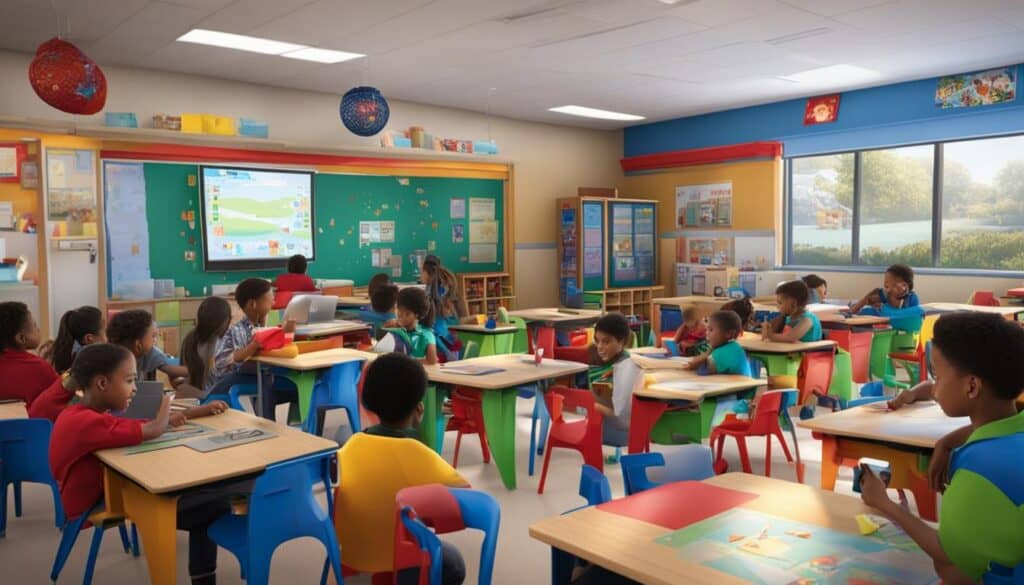Welcome to our guide on the best educational games for 2024! In today’s digital age, learning through video games has become increasingly popular, offering a fun and engaging way for individuals of all ages to acquire knowledge and develop essential skills. Whether you’re a student, a parent, or an educator, these educational games are designed to promote interactive learning and enhance academic performance.
With an abundance of educational game apps available, it can be overwhelming to find the most suitable ones for your needs. That’s why we’ve curated a list of the top educational games in 2024, ranging from preschool to college-level, to cater to a wide range of learners. From language learning to math games, science exploration to test preparation, you’ll find something for everyone.
So, let’s dive into the world of educational games and discover how they can revolutionize the way we learn!
Key Takeaways:
- Educational games provide an interactive learning experience and promote critical thinking skills.
- Learning through video games enhances cognitive abilities and memory retention.
- Preschoolers can benefit from game apps that support early childhood education.
- High school and college students can utilize educational games for subject-specific learning and career readiness.
- The future of educational games lies in the integration of technology, such as virtual reality.
The Importance of Educational Games

Educational games play a crucial role in revolutionizing the learning experience for students of all ages. By combining entertainment with education, these games create an interactive learning environment that fosters engagement and enhances understanding. The integration of technology into education has provided a platform for the development of educational games that cater to different subjects and learning objectives.
The interactive nature of educational games makes learning a fun and enjoyable process for students. As they navigate through challenges, solve problems, and make decisions within the game, they develop critical thinking skills and improve their cognitive abilities. These games encourage students to actively participate in their own learning, increasing their motivation and retention of knowledge.
Interactive learning is a dynamic approach that allows students to explore and discover concepts at their own pace. It promotes active engagement with the material, which is crucial for effective learning. Rather than passively consuming information, students are actively involved in the learning process, making connections and applying knowledge in a practical context.
The Benefits of Educational Games:
- Enhances critical thinking and problem-solving skills
- Promotes active engagement and participation
- Improves cognitive abilities and memory retention
- Creates a fun and interactive learning experience
- Develops creativity and innovation
Interactive learning through educational games provides a unique opportunity for students to acquire knowledge and skills in an engaging and immersive way. It not only enhances their academic performance but also prepares them for the challenges of the modern world by developing essential skills such as critical thinking, problem-solving, and creativity.
As technology continues to advance, the future of educational games holds even greater potential. The integration of virtual reality and other emerging technologies will further enhance the immersive learning experience, allowing students to explore new worlds and concepts in a way that was never before possible.
Benefits of Learning Through Video Games

Learning through video games offers a wide range of educational benefits that go beyond traditional teaching methods. By integrating interactive gameplay with educational content, students can engage in a dynamic learning experience that promotes cognitive skills and enhances their overall learning outcomes.
One of the key advantages of learning through video games is the development of cognitive skills such as problem-solving, critical thinking, and decision-making. Video games often present players with complex challenges that require them to analyze information, strategize, and make effective decisions to progress. These cognitive skills are essential in real-world situations and can be honed through interactive gameplay.
In addition to cognitive skills, learning through video games also improves memory retention. Studies have shown that active engagement in a learning environment, such as playing video games, enhances the brain’s ability to retain information. By providing a fun and immersive experience, video games create a conducive learning environment that facilitates long-term memory formation.
Enhancing creativity through video games
Another significant benefit of learning through video games is the promotion of creativity. Many educational video games encourage players to think creatively and find innovative solutions to challenges. By providing a platform for experimentation and imagination, video games foster creative thinking skills that can be applied in various aspects of life.
Overall, learning through video games offers a unique and effective approach to education. By harnessing the engaging nature of video games, students can acquire knowledge, develop critical thinking skills, and enhance their overall learning experience. As technology continues to advance, the potential for using video games as educational tools will only increase, opening up exciting possibilities for the future of learning.
Top Educational Games for Elementary School Students
Elementary school students can enhance their learning experience through engaging educational games that are specifically designed to support their development. These games provide a fun and interactive way for children to explore various subjects while strengthening their skills in language learning and math.
Language learning games play a crucial role in improving vocabulary, grammar, and communication skills. They offer engaging activities that help children learn new words, practice pronunciation, and develop their reading and writing abilities. Whether it’s through interactive stories, word puzzles, or language exercises, these games create an immersive environment for young learners to improve their linguistic abilities.
Math games, on the other hand, offer an enjoyable way for children to develop their numeracy skills. By solving math problems, puzzles, and quizzes, elementary school students can enhance their understanding of mathematical concepts, improve their problem-solving abilities, and strengthen their critical thinking skills. These games provide a hands-on approach to learning math and make the subject more engaging and accessible.
Some popular educational games for elementary school students include:
- ABC Adventure: A language learning game that teaches children the alphabet, letter sounds, and basic vocabulary through interactive activities and games.
- Math Mania: A math game that challenges students to solve various math problems, from addition and subtraction to multiplication and division, in a fun and engaging way.
- Word Wizard: An interactive language game that enhances vocabulary and spelling skills through word puzzles, crosswords, and word-building activities.
- Number Ninja: A math game that helps students practice their mental math skills while engaging in exciting ninja-themed challenges and activities.
- Storyland Adventures: A language learning game that immerses children in interactive storybooks, allowing them to improve their reading comprehension and language skills while enjoying captivating stories.
By incorporating these educational games into their learning routine, elementary school students can not only have fun but also develop essential skills that will benefit them academically and beyond.
Educational Games for Middle School Students

When it comes to middle school students, educational games offer a perfect blend of fun and learning. These games are designed to engage students in various subjects, making the learning process more interactive and enjoyable. Middle school is a crucial time for students to develop critical thinking skills and explore new concepts. By incorporating science games and history games into their education, students can enhance their understanding of these subjects while having a great time.
Science games for middle school students provide hands-on experiences that allow them to explore the wonders of the natural world. These games encourage students to conduct virtual experiments, solve science-related challenges, and develop a deeper understanding of scientific concepts. Whether it’s learning about the human body, ecosystems, or physics, science games make complex topics more accessible and engaging.
In addition to science games, history games play a vital role in middle school education. These games transport students to different time periods and cultures, allowing them to immerse themselves in history. From exploring ancient civilizations to understanding the impact of significant historical events, history games provide an interactive way for students to grasp important concepts and develop an appreciation for the past. Through engaging storytelling and gameplay, these games bring history to life and make it relatable for middle school students.
Benefits of Educational Games for Middle School Students
- Enhances critical thinking and problem-solving skills
- Promotes active learning and engagement
- Improves retention of information
- Fosters a love for learning through interactive gameplay
- Encourages self-paced learning and independent thinking
“Educational games provide middle school students with an immersive learning experience that goes beyond traditional textbooks. By incorporating science games and history games into their education, students can develop critical thinking skills and gain a deeper understanding of these subjects.”
By integrating educational games into the middle school curriculum, educators can create a dynamic and effective learning environment. These games not only help students grasp complex concepts but also foster a love for learning that extends beyond the classroom. By combining entertainment and education, educational games for middle school students set the stage for academic success and lifelong learning.
Educational Games for High School Students

High school students can greatly benefit from educational games that cater to their specific needs, whether it’s test preparation or subject-specific learning. These games provide an engaging and interactive way for students to reinforce their knowledge and skills while having fun. Here are some educational game options that high school students can explore:
1. SAT/ACT Prep Games
Preparing for college entrance exams can be stressful, but educational games can make the process more enjoyable. SAT/ACT prep games offer practice questions, strategies, and tips to help students improve their performance on these important tests. These games cover various sections, such as math, reading, writing, and vocabulary, allowing students to target specific areas for improvement.
2. Subject-Specific Games
For students looking to deepen their understanding in specific subjects, there are educational games that offer interactive learning experiences. Whether it’s advanced science concepts, complex math problems, or foreign language acquisition, subject-specific games provide a platform for high school students to explore and engage with the subject matter in a dynamic way.
“Educational games provide high school students with a unique opportunity to learn and apply their knowledge in a fun and interactive way.”
By incorporating these educational games into their learning routine, high school students can not only enhance their academic performance but also develop important skills such as critical thinking, problem-solving, and decision-making. These games offer a balance between education and entertainment, making the learning process more enjoyable and effective.
Educational Games for College Students
College students can greatly benefit from educational games that are designed to enhance their career readiness and skill development. These games provide a unique and interactive learning experience that complements traditional classroom instruction. By integrating gamification into their education, college students can improve their problem-solving abilities, critical thinking skills, and overall academic performance.
One example of an educational game for college students is a time management simulation that allows players to learn effective time management techniques in a virtual environment. This game provides practical strategies for organizing priorities, setting goals, and maximizing productivity, which are essential skills for success in college and beyond. Another game focuses on financial literacy and helps students develop a solid understanding of budgeting, investing, and personal finance, ensuring they are well-prepared for their financial futures.
Additionally, educational games for college students can also help develop important career-related skills. For instance, there are games that simulate realistic job interview scenarios, allowing students to practice their interviewing skills and enhance their confidence. Other games focus on communication, teamwork, and leadership, helping students develop the soft skills that are highly valued by employers.
Benefits of Educational Games for College Students:
- Enhance career readiness and skill development
- Improve problem-solving and critical thinking abilities
- Provide practical knowledge in areas such as time management and financial literacy
- Develop essential soft skills like communication, teamwork, and leadership
- Create an engaging and interactive learning experience
Incorporating educational games into college curricula can empower students to take control of their own learning and actively participate in their educational journey. These games provide a dynamic and immersive learning environment that fosters skill development and prepares students for future success in their chosen careers.
Best Educational Game Apps for Preschoolers
Preschoolers can benefit greatly from educational game apps that support early childhood education and promote the development of fine motor skills. These apps provide a fun and interactive way for young children to explore letters, numbers, shapes, and colors, while also enhancing their cognitive abilities.
One highly recommended educational game app for preschoolers is “ABC Adventures,” which offers a variety of activities to help children learn the alphabet. Through engaging games and interactive exercises, children can practice letter recognition, phonics, and basic spelling skills.
Another top-rated app is “123 Explorer,” which focuses on early number recognition and counting skills. With colorful visuals and engaging gameplay, children can learn to identify numbers, count objects, and understand basic mathematical concepts.
In addition to these apps, “Colors World” is an excellent choice for preschoolers to learn about colors and develop their fine motor skills. This app offers various painting and drawing activities where children can explore different colors, experiment with artistic techniques, and unleash their creativity.
Key Features of Educational Game Apps for Preschoolers
- Interactive activities that engage and entertain young children
- Focus on early childhood education, including letters, numbers, shapes, and colors
- Promote fine motor skills development through drawing, painting, and other creative activities
- Age-appropriate content and user-friendly interface
- Encourage independent learning and problem-solving
- Offer progress tracking and parental controls for a safe and personalized learning experience
These educational game apps for preschoolers provide a valuable learning tool for parents and educators alike. By incorporating technology into early childhood education, children can develop important skills while having fun and engaging with educational content.
Educational Games for Parents and Teachers
Educational games are not just for students; parents and teachers can also reap the benefits of these interactive learning tools. By incorporating educational games into their teaching methods or home activities, parents and teachers can create a more engaging and effective learning environment for children.
For parents, educational games provide an opportunity to actively participate in their child’s education while making learning enjoyable. These games can be used to reinforce concepts taught in school, develop problem-solving skills, and promote critical thinking. By playing educational games with their children, parents can also bond with them and create lasting memories.
Teachers can integrate educational games into their lesson plans to enhance learning outcomes. These games can be used as supplementary resources to engage students, assess their understanding of topics, or as a tool for collaborative learning. Additionally, educational games can help teachers track student progress and identify areas where further support may be needed.
The Benefits of Parent Involvement
When parents are actively involved in their child’s education, it has a positive impact on their academic success and overall development. Educational games provide an avenue for parents to be involved in their child’s learning journey and support their educational goals. By playing these games together, parents can foster a love for learning, boost their child’s confidence, and strengthen the parent-child bond.
Similarly, when teachers involve parents in the educational process, it creates a collaborative and supportive learning environment. Parents can gain insights into the curriculum, assist with homework, and reinforce lessons learned in the classroom. The partnership between parents and teachers ensures that children receive a consistent and comprehensive learning experience.
Overall, educational games offer a range of benefits for parents and teachers. These games promote active learning, critical thinking, and collaboration while providing an opportunity for parents to actively engage in their child’s education. By embracing educational games, parents and teachers can create a stimulating environment that nurtures a love for learning and supports academic success.
The Future of Educational Games
Educational games have come a long way in recent years, and the future looks even more promising. With the rapid advancement of technology, educational games are set to revolutionize the way we learn by incorporating immersive experiences and cutting-edge technologies. One of the most exciting developments in this field is the integration of virtual reality (VR) into educational games.
Virtual reality has the potential to transform traditional learning methods by providing a highly realistic and immersive learning environment. Students can step into virtual worlds, explore historical settings, dissect and examine objects in 3D, and solve complex problems in a hands-on way. This technology has the power to bring subjects to life and engage students in a way that was never before possible.
But virtual reality is just the beginning. The future of educational games also holds the promise of advanced technologies like augmented reality, artificial intelligence, and gamified learning platforms. These technologies can enhance personalized learning experiences, adapt to individual student needs, and provide real-time feedback to optimize the learning process.
Furthermore, educational games will continue to evolve and cover a wider range of subjects and skills. From science and math to language learning and creative problem-solving, there will be educational games available for students of all ages and interests. These games will not only facilitate academic learning but also promote important life skills such as critical thinking, collaboration, and adaptability.
In conclusion, the future of educational games is incredibly bright. With the integration of virtual reality and other advanced technologies, these games have the potential to revolutionize the way we learn and make education more engaging, interactive, and effective.
Conclusion
Educational games have revolutionized the way we learn, providing interactive and engaging experiences that promote academic growth. Through these games, students of all ages can immerse themselves in a world of knowledge, enhancing their understanding and retention of various subjects.
By integrating technology into education, educational games have opened up new frontiers for interactive learning. As we look towards the future, the potential advancements and innovations in this field are truly exciting. The incorporation of virtual reality and other cutting-edge technologies will create even more immersive and effective learning experiences.
With the continuous development of educational games, students can learn at their own pace and in a way that suits their individual learning styles. These games foster critical thinking, problem-solving, and decision-making skills, preparing students for success in the modern world.
As we embrace the future of educational games, we can expect to see a greater emphasis on personalized learning, gamified assessments, and collaborative platforms that bridge the gap between home and school. The future holds immense possibilities for the integration of educational games into the mainstream curriculum, enabling students to thrive in an increasingly digital landscape.
FAQ
What are educational games?
Educational games are interactive learning experiences that engage students and enhance their understanding of various subjects.
What are the benefits of learning through video games?
Learning through video games enhances cognitive skills such as problem-solving, critical thinking, and decision-making. It also improves memory retention and promotes creativity.
What are some educational games for elementary school students?
Some educational games for elementary school students include language learning games, math games, and interactive activities that help develop literacy and numeracy skills.
Are there educational games for middle school students?
Yes, there are educational games for middle school students that cover various subjects like science, history, and geography. These games encourage exploration and critical thinking in these areas.
Are there educational games for high school students?
Yes, high school students can utilize educational games for test preparation and subject-specific learning. There are games that focus on SAT/ACT prep, advanced science and math concepts, and foreign language acquisition.
Are there educational games for college students?
Yes, college students can benefit from educational games that focus on career readiness and skill development. There are games that help with time management, financial literacy, and critical thinking.
Are there educational game apps for preschoolers?
Yes, there are educational game apps that support early childhood education and promote the development of fine motor skills. These apps focus on letters, numbers, shapes, and colors.
Can parents and teachers use educational games?
Yes, parents and teachers can utilize educational games to facilitate learning. There are games that promote home-school collaboration and involve parents in their child’s education.
What is the future of educational games?
The future of educational games lies in the integration of technology, such as virtual reality, to create immersive and interactive learning experiences.
 Online Gaming Circuit
Online Gaming Circuit




